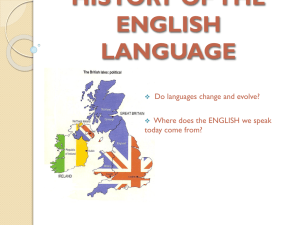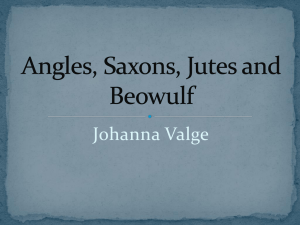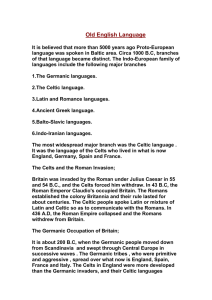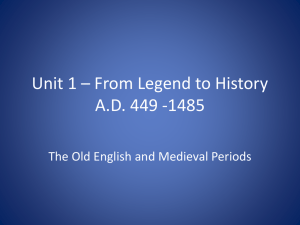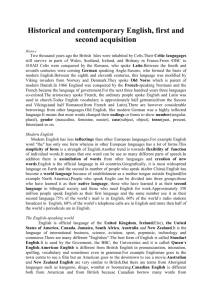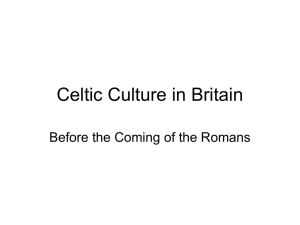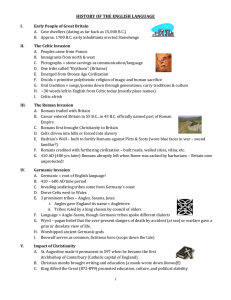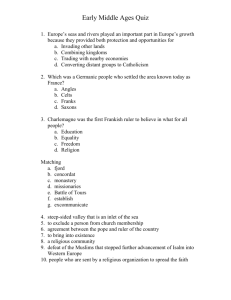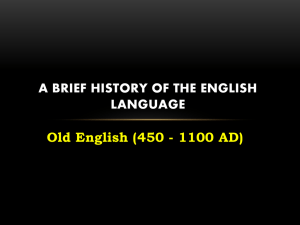ETYMOLOGY NOTES 1 Mr. Maloney
advertisement
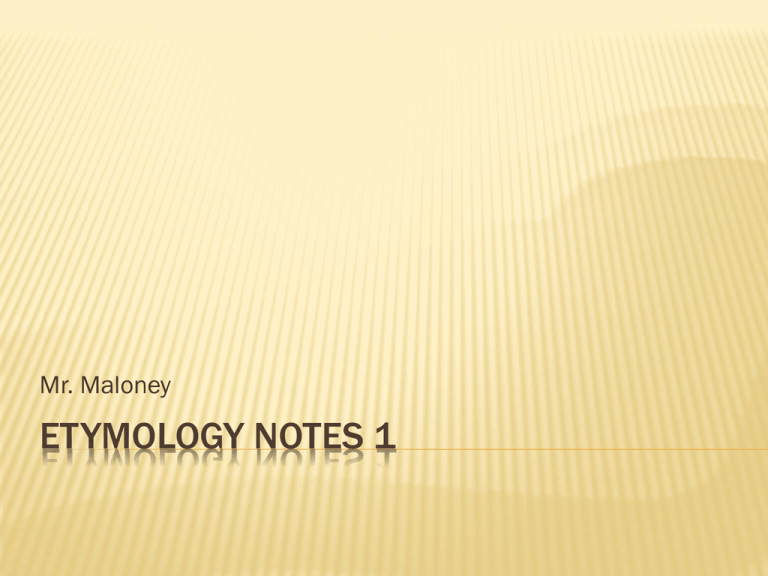
Mr. Maloney ETYMOLOGY NOTES 1 DISCUSSION 1. How does a language begin? 2. How does a language develop? 3. What are some examples of new words? THE FAMILY TREE The Indo-European Languages: Celtic Germanic Latin Indo-Iranian Balto-Slavic INDO-EUROPEAN LANGUAGES English is part of the Indo-European family of languages. These languages are related because they started from the same source and share the same basic structure. ENGLISH IN ENGLAND? English is not the original language of England. English did not begin until the fifth century A.D. The Celts drove out the earliest inhabitants of England and brought with them key parts of civilization…cattle, metal tools, the wheel, and… CELTS TO ROMANS The Celts brought with them language! Shamrock Galore Plaid Slogan Whiskey penguin ROMAN POWER In 43 A.D. forty thousand Roman soldiers invaded Britain. Why would the Romans conquer England? ROMAN RULE!!! The Romans brought in Latin and Christianity to England? Why is this significant to language? The Romans stayed in Britain for 400 hundred years. Why would they leave? Who comes next? FIRST SIGNS OF ENGLISH The Celts, Picts, and Scots fought for control of the land. The Celts hired a tribe called the Jutes to help them win the land control. The Jutes and Celts won, however…. THE JUTES The Jutes refused to leave the land! The brought with them their Germanic language. Two other key Germanic tribes arrived The Angles The Saxons ANGLES AND SAXONS The Germanic tribes overran England and forced the Celts to leave. The word Angles gradually changed into the word English. The Celts were called “Weales” (Welsh) which means foreigner. GERMANIC BASE OF ENGLISH Germanic words make up 1/5 of our vocabulary but we use them more often than any other words. Examples: Hand, thumb, leg, ankle, hip Man, wife, child Sun, moon, stars Love, hate, friendship Sleep, wake, hungry, food, meat, milk, floor, roof What do these words have in common? OLD ENGLISH OE=Old English in the dictionary 700 A.D. to 1150 A.D. Significance of Beowulf? “Com on wanre niht”= Came on the dark night BASIC TERMINOLOGY Prefix: placed at the beginning of a word to change its meaning. Suffix: placed at the end of the word to change its meaning. Root: base of a word THE NORMAN CONQUEST Around 1066 a group of Vikings from Normandy called Normans invaded England. The Normans led by William the Conqueror defeated the English forces and the French language became the official language of England? WAIT….WHAT? How do you believe the English language survived? A SURVIVING LANGUAGE After the conquest, the English people were forced to become servants or peasants. The French language was reserved for the wealthy…government, law, and business. The lower classes kept the English language alive and strong, it even became easier to use and understand because it was spoken. How could the language be easier to use? MIDDLE ENGLISH In 1204, the Normans lost their land in France and adopted England as their permanent home. To strengthen numbers they began to “mingle” with the English people more often and created an English/French language. Examples: court, servant, feast, privilege, peace, war, treasure, mercy, crime, reward. IMPORTANT INFLUENCES Geoffrey Chaucer The Canterbury Tales William Shakespeare Ushered in Modern English Johannes Gutenberg Invented the printing press LATIN AND GREEK Latin was the language of learning. Latin was used to express an idea or create a word when there was nothing available in English. Examples: celebrate, exist, genius, nervous Greek was the language of storytelling. People studied Greek and passed on the stories to future generations. MODERN ENGLISH Today’s English has nearly the same sound, style, and sentence structure as the English of the 16th century (Shakespeare’s era). The major change is Vocabulary: English has expanded freely by coining, borrowing, and adapting words!
